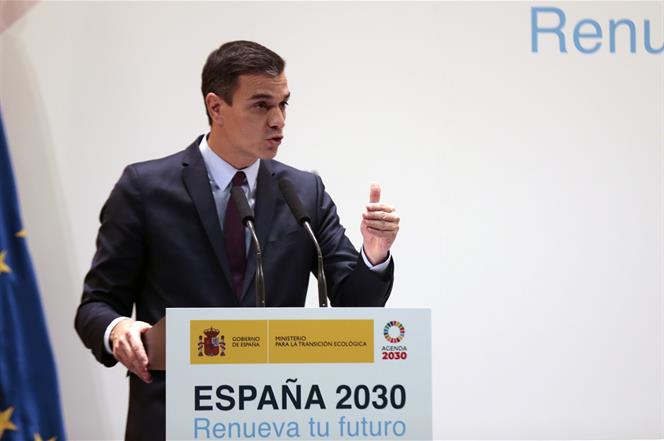
Fast-approaching snap elections in Spain will decide whether the multibillion-euro renewables build-up proposed this week will ever become a reality.
Draft climate change legislation green-lighted by Spanish ministers on Friday mandates fully renewable power generation and 90% lower greenhouse gas emissions by 2050.
Try Premium for just $1
- Full premium access for the first month at only $1
- Converts to an annual rate after 30 days unless cancelled
- Cancel anytime during the trial period
Premium Benefits
- Expert industry analysis and interviews
- Digital access to PV Tech Power journal
- Exclusive event discounts
Or get the full Premium subscription right away
Or continue reading this article for free
The package – which remains a statement of intent and cannot be debated by MPs in time before the snap elections of 28 April 2019 – sets an interim 74% renewable power generation target by 2030, up from the current 38-40% figure. By that year, PV would need to produce 66,373GWh, a figure only surpassed by wind’s 116,110GWh.
In terms of final energy consumption, renewables would need to grow from the current 17% share to 42% by 2030. The government’s goal is for PV solar capacity in particular to rise from 4.9GW (2015) to 8.4GW (2020), 23.4GW (2025) and 37GW (2030); only wind power (50GW) would overtake PV by the latter year
3GW of renewable auctions per year
The roadmap of socialist president Pedro Sánchez lays out plans on how to finance such meteoric growth. Under the draft legislation, a fifth of general budgets would be earmarked for the low-carbon transition. Some €236 billion would be mobilised between 2021-2030 alone, of which €125 billion-plus would be reserved for renewables and grid upgrades.
The document lays the foundations for clean energy incentives going forward, a thorny issue in a country that rocked the PV industry as it retroactively scrapped feed-in-tariff schemes in the early 2010s.
Auctions – which resumed in Spain in 2015 – would continue under a new system that would support renewables through a fixed price for all power generated. The new regime would have to be fleshed out by future governments but the plan already proposes a minimum target – 3GW – for renewable volumes to be auctioned every year.
Electrified transport would too get a boost under Sánchez’s blueprint, which would mandate the addition of charging infrastructure of 22kw-plus at fuel and service stations in Spain. The obligation would apply to facilities with 5 million or more in combined fuel and diel sales in 2018.
The document also foresees a “massive” roll-out of self-consumption, badly stung in the years between the country’s adoption of a so-called sun tax in 2015 and its phase-out in 2018. A self-consumption national strategy will set out actions – concessional finance, third-party management – for ministries, regional and local authorities to promote the approach.
6GW in energy storage capacity by 2030
The state-sponsored push for renewables comes at a time when PV players have found success without the need for government support. Policymakers are however still expected to play a key role in expanding the grid, which some fear would collapse if it had to process in its current state the capacity under planning.
Sánchez’s roadmap acknowledges that integrating the planned renewable surge will require planning. The government’s answer is a vaguely-worded commitment to “adapt” the grid to any capacity influx and a 6GW boost to energy storage capacity by 2030: 3.5GW for pumped storage, 2.5GW for actual batteries.
As he discussed the legislative package this week, the president stressed that a great deal of the jobs and investment opportunities at stake lie with renewables. Spain, he said, is “privileged” to be undertaking this transformation armed with “cheap and unlimited” solar and wind energy.
The success of his climate change plan now lies beyond his control, however, and will be decided by Spanish voters at the election now two months away. Recent polls place Sánchez’s socialist party PSOE as the frontrunner, showing however that a right-wing coalition of opposition parties PP, Ciudadanos and Vox would overtake any similar left-wing alliance.






